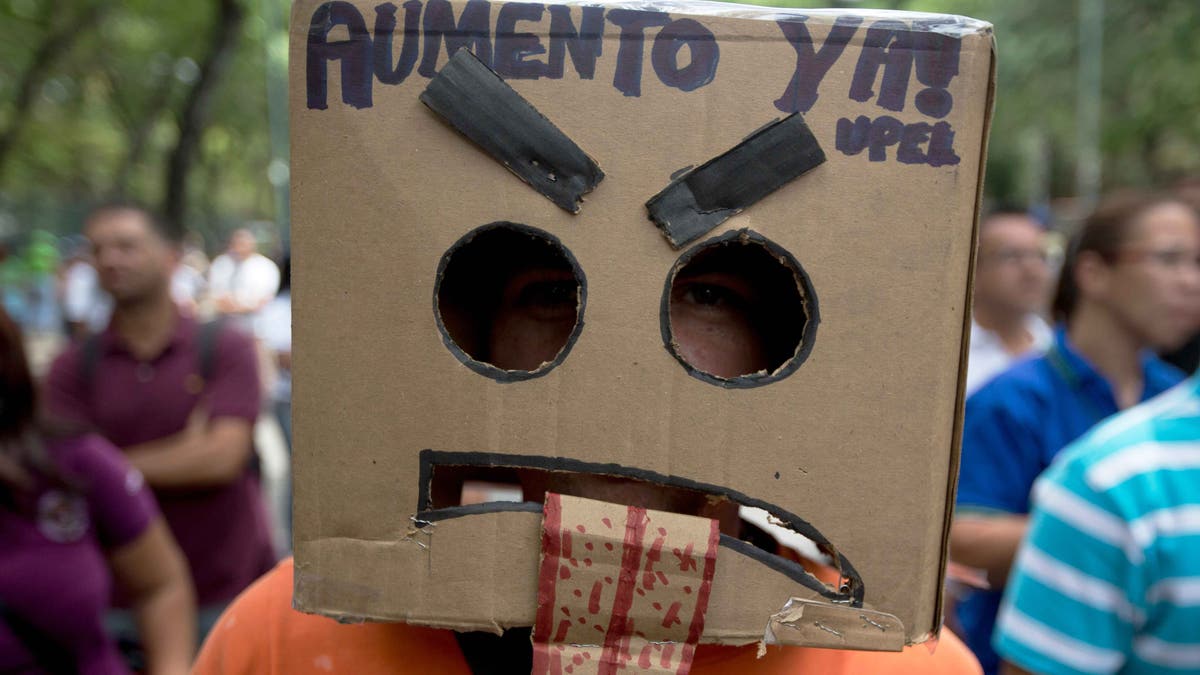
In this Thursday, May 28, 2015 photo, a teacher with the head covered by a box with a sign that reads in Spanish "Salary raise now" during a protest at Venezuela's Central University, UCV, in Caracas, Venezuela. More than 700 of the 4,000 professors who once taught at the highly respected Central University have quit during the last four years, some taking better-paying jobs in other fields inside the country while others have been lured to more attractive academic posts at universities abroad. (AP Photo/Fernando Llano)
Caracas – If you are between 15 and 29 years old and you live in Venezuela, there’s a one in four chance you are planning to leave the country and put down roots somewhere else.
The acute financial crisis in the South American country is hitting particularly hard on the young, some of whom, having had grown up under the 16-year-old Chavista regime, still have hopes of starting a family in a society where they can at least dream of prosperity.
An ordinary citizen here needs more than four months of average monthly salary to pay the rent of a small apartment, which explains why 66 percent of youngsters still live with their parents. And buying a used car would require more than 170 months of work — without spending on anything else.
Under such conditions, it’s not surprising that 27 percent of 15- to 29-year-olds are thinking about emigrating, according to research conducted by the Andres Bello University. Of those, the study said, 29 percent have their minds set on the U.S., 18 percent are planning to go to Spain and 9 percent will try neighboring Colombia.
“I never thought about leaving my country until one or two years ago,” said Laura Cadelleo, who is 20 years old and studies film in Caracas. “That’s when I realized that if you earn an average salary [in Venezuela] it will be almost impossible to live independently.”
Candelleo and her boyfriend Juan Díaz are moving to Chile in August along with two other friends. They are all in their early 20s and say they can’t help feeling pessimistic amid a 200 percent inflation rate that keeps climbing.
“We have studied the situation,” Diaz said. “If we find a decent job, we can rent a good apartment in Santiago de Chile and live smoothly; we have some friends that already did that and are doing well,” he added.
The average monthly salary in Venezuela today is 8,500 bolivars, which translates into $20.50 dollars at the so-called Simadi exchange rate, or around $28 in the black market.
(The official dollar rate, 6.3 bolivars per dollar, is reserved for government purposes only.)
A quick search in tuinmueble.com, a Caracas-based website to rent or buy properties, is enough to get a sense of the impossible rental prices with a $20-a-month salary. A studio apartment, for instance, goes for around 40,000 bolivars a month, or $96.
Owning a car is also nearly hopeless. According to tucarro.com, a popular used-cars website, a compact model will cost you around $3,600 – that’s three years and three months’ salary.
Aware of the creeping malaise, the government has put in place programs aimed at the youth like Misión Vivienda, a housing program that provides couples, at no cost but also without providing a title, one of the 700,000 apartments built since the program launched in 2012.
But Candelleo and Díaz are skeptic.
“We read the newspapers and see a bunch of news about crimes [perpetrated] in the Misión Vivienda buildings, and there is a lot of corruption associated to it,” said Diaz. “People do have to pay to get the apartments,” he added.
Meanwhile, the young Venezuelans who are not leaving try to take advantage of the numerous government-run programs. Those in the opposition believe there is still hope.
“We try to show the youth that there is hope and that it is possible to do things differently in Venezuela,” said Brian Fincheltud, who works with the political party Primero Justicia in Sucre, a municipality controlled by the opposition in the state of Miranda.
“More than 50 percent of our employees are less than 30 years old. We are asking people to give us the chance to govern in more spaces to bring change,” he said.
However, youngsters like Díaz and Candelleo say Venezuela’s economic crisis won’t be resolved so easily and have lost confidence in all politicians.
“Recovery is going to take years, no matter who is governing. At the end all the politicians are alike,” said Díaz.
